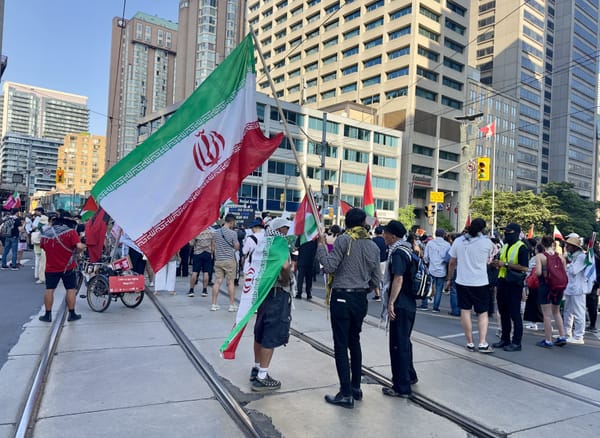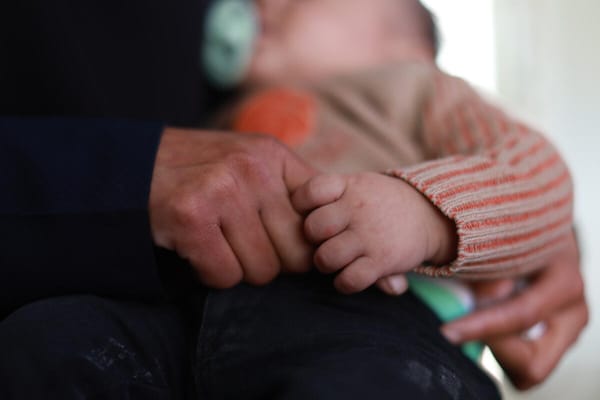Editor’s note: This article was written in response to the September 18 article titled ‘Are Canadian Jews Complicit In Israel’s Genocide In Gaza?,’ written by The Maple’s opinion editor, Davide Mastracci. This rebuttal was edited by The Maple’s news editor, Alex Cosh.
In recent years, I’ve noticed a glaring contradiction in how pro-Israel groups talk about the Jewish community’s relationship to the State of Israel.
On the one hand, we’re told by Canada’s preeminent pro-Israel lobbying group, the Centre for Israel and Jewish Affairs (CIJA), that Jewish people in the Diaspora aren’t responsible for “events in the Middle East” and that it’s antisemitic to hold them accountable for the actions of a foreign state.
Yet CIJA is just as quick to say that it acts on behalf of the interests of an amorphous “Jewish community” while at the same time it attempts to have Israel critics deplatformed, shield Israeli leaders from accountability at the International Criminal Court, and regurgitates Israeli government talking points.
CIJA and its allies have laid a trap, whether consciously or not, simultaneously insisting that we conflate the interests of local Jewish communities with those of the State of Israel while demanding that we don’t hold them responsible for the state’s increasingly hideous actions.
The dynamic of Jewish advocacy groups and the community institutions they dominate doubling as pro-Israel lobbying outfits certainly warrants thorough critique.
But it must be done with caution and care so as to avoid giving those pro-Israel outfits ammunition to shift the conversation from the unbelievably brutal reality Israel has created on the ground in Gaza, the West Bank and Lebanon, to a supposedly unprecedented surge of antisemitism at home.
In this respect, Davide Mastracci’s September 18 piece headlined “Are Canadian Jews Complicit In Israel’s Genocide In Gaza?” misses the mark.
Davide’s article is more nuanced than its awful click-bait headline suggests. There are certainly parts of it with which I agree.
“The idea that Jewish Canadians are responsible for Israeli government actions merely by virtue of being Jewish is wrong and dangerous [emphasis in original],” Davide correctly notes in the article’s third paragraph.
But the article’s overall framing of a uniquely Jewish institutional culpability for Israeli crimes is deeply misguided and can only serve to bolster a narrative that the situation in Palestine is the result of a primordial, intractable religious conflict, with Israel representing Jews and Jews representing Israel.
Where I Agree
Davide correctly notes how the idea of not holding Jews collectively responsible for the Israeli state’s actions “has been cynically stretched” by pro-Israel propagandists to include holding prominent individual Jews who use their influence to support Israeli actions accountable for their words and deeds.
There’s no better example of this than the response to anti-genocide protestors putting up posters and splashing red paint on the exterior of Indigo’s flagship downtown Toronto bookstore. This was depicted as an alleged antisemitic hate crime against CEO Heather Reisman, rather than as a protest against her financial support for “lone soldiers” in Israel.
Media accounts either entirely ignored or significantly downplayed the fact that Reisman founded a charity that provides scholarships for Jews from around the world who serve in the Israeli military. Critics allege this may run afoul of Canadian charity laws prohibiting support for another country’s military.
Davide, to his credit, noted multiple instances of undeniably antisemitic acts in Canada over the past year, including gunshots fired at an ultra-Orthodox Jewish school for girls in May. One could add to that similar incidents in Montreal, or an attempted arson at a Vancouver synagogue.
He also noted a pernicious, knee-jerk assumption that these acts were committed by someone connected to the Palestine solidarity movement, which ignores the possibility that an increasingly empowered and mobilized far-right could very well have committed these acts, knowing how easily blame would be shifted elsewhere.
These are all important points, but as the piece continues, it becomes increasingly apparent that Davide should have thought through his arguments more rigorously before publishing.
Complicity
Davide’s argument begins to crumble when he distinguishes between elements of the Jewish community who may be legally complicit in Israel’s genocide of Palestinians in Gaza and those who may be morally complicit.
I don’t have much issue with the legal complicity argument he makes, under which he categorizes Jewish Canadian government officials, which he correctly notes are “no worse” than non-Jewish officials who share the same views, and Jewish Canadians who choose to serve in the Israeli military.
There’s no question that Jewish Canadians who serve in the Israeli military are legally complicit in genocide if they’re found to have committed acts that violate the Genocide Convention.
But if Davide agrees that Jewish Canadian government officials are “no worse” than their non-Jewish counterparts, it’s unclear to me why Montreal Liberal MP Anthony Housefather invoking his Jewish identity in defence of Israel’s slaughter makes him uniquely complicit in a legal, or even moral, sense.
While Housefather may be uniquely irritating and sanctimonious in his justifications for Israel’s genocidal war, he’s not a cabinet minister.
There’s a reason why Palestinian Canadians whose relatives have been killed in Israel’s assault on Gaza directed their lawsuit to stop Canadian arms sales to Israel towards Foreign Affairs Minister Mélanie Joly. She is the one with the power to stop the exports.
How Do You Measure Moral Complicity?
When we get to the section of the article on moral complicity, Davide’s point becomes even murkier.
He draws heavily from sociologist Robert Brym’s article “Jews and Israel 2024: A Survey of Canadian Attitudes and Jewish Perceptions,” published in the Canadian Jewish Studies journal. Brym’s data shows:
- 69 per cent of Canadian Jews say it’s antisemitic to deny the need for a Jewish state,
- 66 per cent say it’s antisemitic to say Israel is an apartheid state,
- 65 per cent say it’s antisemitic to boycott Israeli products,
- 64 per cent say it’s antisemitic to accuse Israel of genocide and
- 26 per cent say it’s antisemitic to criticize specific Israeli policies.
These figures are no doubt depressing and distressing, given the broad consensus among international human rights groups, including Israeli ones, that Israel is an apartheid state. There is also a growing consensus among Holocaust and genocide studies scholars that Israel is, at the very least, on the verge of committing genocide, for which it’s on trial at the International Court of Justice.
But is everyone who misguidedly believes it’s antisemitic to accuse Israel of genocide really morally complicit in genocide? I suppose in some sense they are, particularly if the only other option is legal complicity.
But rather than distinguishing between legal and moral complicity for genocide, I think it’s more illustrative to distinguish between those who are actively and passively complicit.
People who travel across the world to join the Israeli military; billionaires who use their money to support them; the companies selling real estate in occupied territory and the board members who allow their synagogues to be spiritually desecrated by hosting illegal land sales; the politicians who enable it; the lobby groups who pressure them and the propagandists who cheer it all on are actively complicit in Israel’s genocide.
But Jewish people who simply lack empathy for what Zionism means to the Palestinians, whether due to what they learned in school, saw on TV, read in the newspaper or heard at their synagogue, are passively complicit. They have no problem with what Israel is doing, but aren’t actively participating in it.
They might say something awful online or in-person, drop some change in a donation box or give money that indirectly funds anti-Palestinian lobbying activities, but their level of complicity is minuscule compared to the active complicity of Jewish communal leaders, not to mention powerful non-Jewish supporters of Israel.
Nuances Of Emotional Attachment
Davide notes Brym’s finding that 70 per cent of Canadian Jews are either “very” or “somewhat” emotionally attached to Israel, and that this was a seven percentage point decrease from September 2023.
Brym’s study was conducted throughout February 2024. A decrease of seven percentage points over less than half a year is no small decline.
“At this rate, it would take another 50 months or so of genocide in Gaza for Jewish Canadian emotional attachment to Israel to approach 0 per cent, assuming the drop is even because of it,” Davide writes snarkily.
But he ignores Brym’s explicit speculation that this declining attachment to Israel is a result of a growing fraction of Jewish Canadians who are disenchanted with many Israeli policies, including the 38 per cent who oppose the colonization of the West Bank (euphemistically referred to as building “Jewish settlements”) and 26 per cent who regard Israel’s assault on Gaza over the past year as “excessive.”
These are by no means majorities, and there’s undoubtedly overlap between the quarter of Jewish Canadians who believe Israel has gone too far in Gaza and the two-thirds who think it’s antisemitic to call it genocide, but it does complicate the argument for a uniquely Jewish culpability for Israeli misconduct.
Moreover, emotional attachment is a tricky thing — it’s by definition irrational. I grew up in Toronto’s Jewish community. I went to a private Jewish day school for the bulk of my K-12 education. My grandmother was an Auschwitz survivor and staunch Zionist. I know how deep the pro-Israel indoctrination runs in the Jewish community.
Through conscious efforts in my teenage and adult life, I learned that what I was led to believe was a fairy tale ending to the history of Jewish suffering came at the expense of the Palestinian people, who were ethnically cleansed and occupied to make room for Jewish settlers. I came to see my intergenerational trauma in the ongoing trauma of Palestinians.
But I would be lying if I said I didn’t still feel some residual emotional attachment to the mythological idea of Israel, even as I strongly believe Jewish safety can only exist outside the confines of a genocidal ethnostate.
I don’t think this makes me complicit in Israel’s genocide in any capacity.
Missing The Big Picture
To conclude with a thought experiment, if all Canadian Jewish Zionists put their ideas into practice and settled in Israel, would Canada still be supporting it? I strongly suspect it would.
Some of Zionism’s main political supporters in its earliest days were European evangelical Christians, antisemites and colonialists, who saw Jewish nationalism as a way to hasten the end times, rid Europe of its Jewish population and establish an imperial outpost in the Middle East.
While Jewish support for Israel grew to become hegemonic in the wake of the Holocaust, lured by the false promise of security, Israel’s military might in a region rich in energy resources was a great material asset to arms manufacturers, oil companies and the banks that invest in them.
Powerful elements within the Canadian Jewish community are undoubtedly instrumental in shaping Canada’s support for it, but there are even more powerful vested interests that benefit from having a militarized Jewish Sparta in the Middle East.
In July, The Maple published a debate between Tara Alami and Liam Meisner on whether the pro-Israel lobby is the main cause for Western support for Israel, as John Mearsheimer and Stephen Walt argued in their 2007 book, The Israel Lobby and U.S. Foreign Policy.
In his piece, Davide appears to have gone a couple of steps further, suggesting that it’s not just the pro-Israel lobby, not just the mainstream Jewish establishment, but the majority of the Jewish Canadian population that is “undoubtedly the most important” source of Canadian support for Zionism.
In doing so, Davide misses the big picture.







